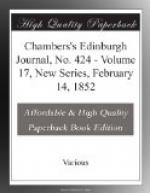I looked at the card which she placed in my hand, and read the address of ‘Mrs Arden, Belgrave Square.’
I found my friend waiting for me; and in a few moments was seated before a blazing fire in a magnificent drawing-room, surrounded with every comfort that hospitality could offer or luxury invent.
‘Here, at least, is happiness,’ I thought, as I saw the family assemble in the drawing-room before dinner. ’Here are beauty, youth, wealth, position—all that makes life valuable. What concealed skeleton can there be in this house to frighten away one grace of existence? None—none! They must be happy; and oh! what a contrast to that poor lady I met with to-day; and what a painful contrast to myself!’
And all my former melancholy returned like a heavy cloud upon my brow; and I felt that I stood like some sad ghost in a fairy-land of beauty, so utterly out of place was my gloom in the midst of all this gaiety and splendour.
One daughter attracted my attention more than the rest. She was the eldest, a beautiful girl of about twenty-three, or she might have been even a few years older. Her face was quite of the Spanish style—dark, expressive, and tender; and her manners were the softest and most bewitching I had ever seen. She was peculiarly attractive to an artist, from the exceeding beauty of feature, as well as from the depth of expression which distinguished her. I secretly sketched her portrait on my thumb-nail, and in my own mind I determined to make her the model for my next grand attempt at historical composition—’the Return of Columbus.’ She was to be the Spanish queen; and I thought of myself as Ferdinand; for I was not unlike a Spaniard in appearance, and I was almost as brown.
I remained with my friend a fortnight, studying the midnight effects of the iron-foundries, and cultivating the acquaintance of Julia. In these two congenial occupations the time passed like lightning, and I woke as from a pleasant dream, to the knowledge of the fact, that my visit was expected to be brought to a close. I had been asked, I remembered, for a week, and I had doubled my furlough. I hinted at breakfast, that I was afraid I must leave my kind friends to-morrow, and a general regret was expressed, but no one asked me to stay longer; so the die was unhappily cast.
Julia was melancholy. I could not but observe it; and I confess that the observation caused me more pleasure than pain. Could it be sorrow at my departure? We had been daily, almost hourly, companions for fourteen days, and the surmise was not unreasonable. She had always shewn me particular kindness, and she could not but have seen my marked preference for her. My heart beat wildly as I gazed on her pale cheek and drooping eyelid; for though she had been always still and gentle, I had never seen—certainly I had never noticed—such evident traces of sorrow, as I saw in her face to-day. Oh, if it were for me, how I would bless each pang which




